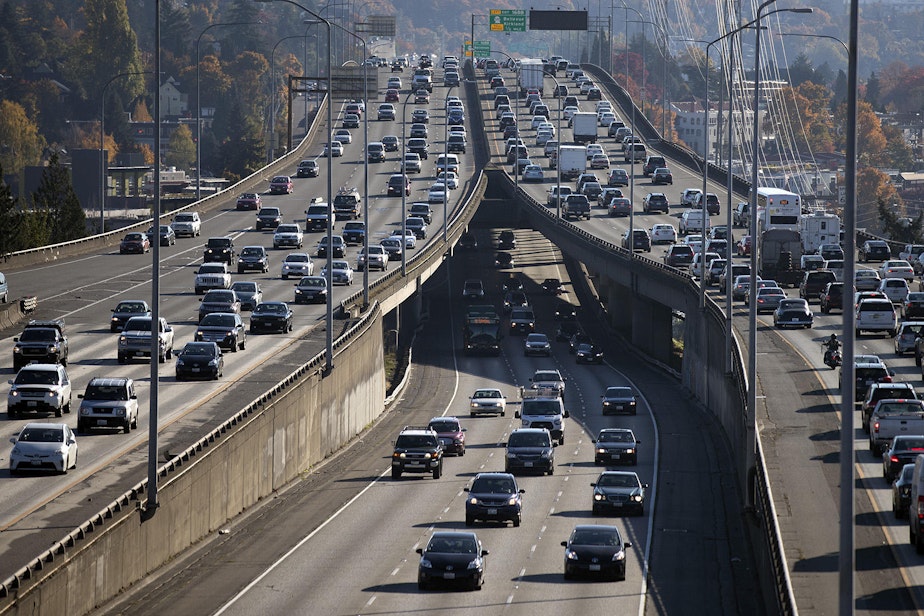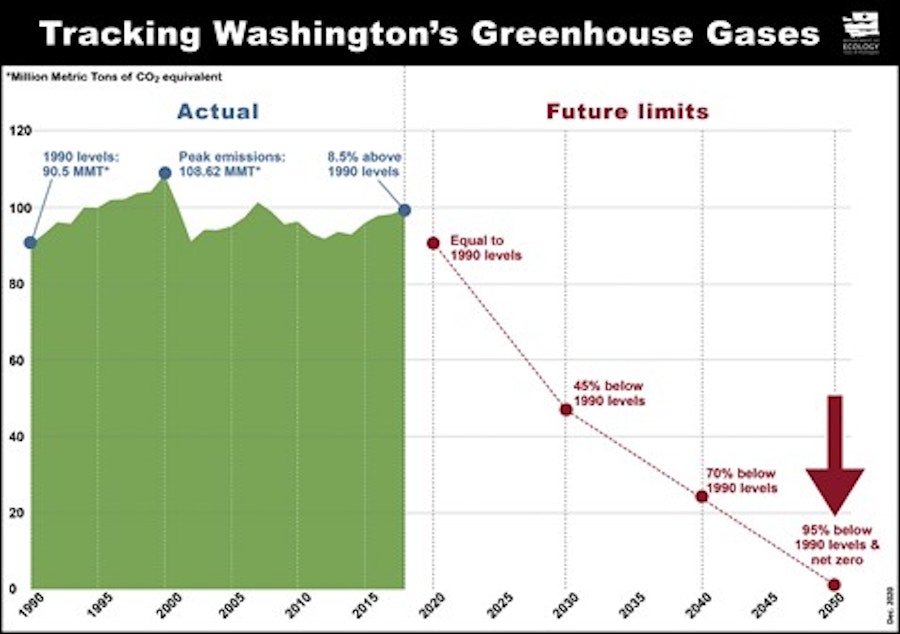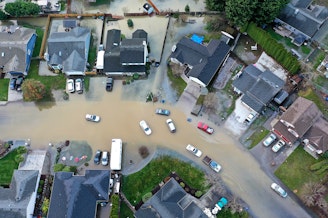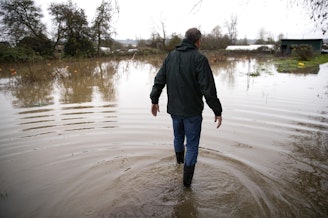Washington state is in danger of breaking its own climate laws, Inslee says

Without urgent action by the Legislature, Washington state will run afoul of its own pollution laws, according to Gov. Jay Inslee.
Many governments and businesses have set voluntary targets to reduce the harm they do to the climate. Seattle has promised to eliminate its climate pollution by 2030, while Amazon promises to be carbon neutral (by polluting less or buying carbon offsets) by 2040, and oil giant BP promises the same by 2050.
Unlike those voluntary pledges, Washington state has had a legal requirement to cut statewide carbon pollution since 2008. The Legislature tightened the carbon screws in 2020, mandating reductions decade after decade, culminating in a 95% reduction of greenhouse gas emissions by 2050.
Inslee said legislation to cap carbon emissions from big polluters and regulate transportation fuels must pass in 2021, even in a pandemic, to keep the state from breaking its own laws.
“We can’t take our eye off the ball of this other crisis. It might be a little slower than Covid, but it will be every bit as devastating to our families and our society,” Inslee said at a press conference Tuesday on the Anacortes waterfront, with sailboats and a forested city park as a backdrop, and oil tankers and two refineries just off camera.
Sponsored
A “low carbon fuel standard” bill would require cleaner energy sources to gradually replace gasoline and diesel. It has passed the Washington House of Representatives and is being considered by the state Senate.
A “cap and trade” or “cap and invest” bill in the state Senate would put a cap on emissions from the state’s largest polluters starting in 2023, and let those businesses buy carbon allowances from the state if they cannot stay below the cap. Revenue from auctions of carbon allowances would fund clean-energy projects, with an emphasis on benefiting communities hardest hit by fossil-fuel pollution.
Both measures have been rejected by Washington legislators in previous years.
“Both of these bills are in place up and down the West Coast of the United States,” Inslee said. “It is time for Washington state to join California, Oregon, and British Columbia in action against carbon pollution in transportation.”
Some businesses and environmental groups support the cap-and-trade measure. Others oppose it.
Sponsored
Strange bedfellows opposing the bill include cement and aluminum manufacturers and environmental-justice advocates, who say the system would not bring cleaner air to communities living near major polluters.
The Association of Washington Business and the Western States Petroleum Association, which represents the oil companies owning four of the five refineries in Washington, say they favor a single federal policy over individual states regulating carbon pollution.
BP, which owns a refinery near Ferndale, left the Western States Petroleum Association in 2020, citing climate-policy differences. The company has taken no position on the low-carbon fuel standard opposed by the rest of the oil sector in the state. A BP executive testified in favor of Washington’s cap-and-trade proposal in January.
“When this program becomes law, innovation to reduce carbon emissions will be incentivized and rewarded,” BP executive Mary Streett told the state Senate Environment, Energy and Technology Committee.
Highway to Heat
Sponsored
Environmental advocates have questioned Inslee’s climate rhetoric, citing his administration’s push to expand major roads like Highway 2 in Everett and the Interstate 5 bridge over the Columbia River.
In March, Disability Rights Washington and climate-justice group Front and Centered called for a halt to spending to expand highways in the state.
They urged Gov. Inslee and legislators to instead prioritize spending on buses and pedestrians, who often lack safe places to walk or roll to get where they need to go.
“All I wanted to do was go to Kmart,” recalled Krystal Monteros, a Tacoma resident and wheelchair user. “I got off the bus, and there was concrete at the bus stop. As soon as I turned, it turned straight to loose gravel for the sidewalk that my front wheels just totally dug into. I was across the street from Kmart, and I couldn’t get to the crosswalk to cross the street to get to Kmart.”
Public works maps show large stretches of Tacoma lacking sidewalks.
Sponsored

The Washington State Senate on Wednesday passed a transportation budget that would spend $834 million in “highway-related initiatives” over the next two years and $15.8 billion over the next 16 years, with much smaller amounts going to other modes of transportation.
Under that bill, the state would spend about one-fifth as much for less-polluting modes of travel (buses, electric ferries and bike and pedestrian routes) over the next two years and $6 billion over the next 16 years.
Inslee said his approach puts maintenance above new or wider roads, but maintenance is not enough.
“We need to build, and we need to build in multiple places,” Inslee said at a March 5 press conference.
Sponsored
Washington state leaders are counting on an influx of billions in federal cash from President Joe Biden’s infrastructure and climate initiative to help pay for better transportation systems in the state.





